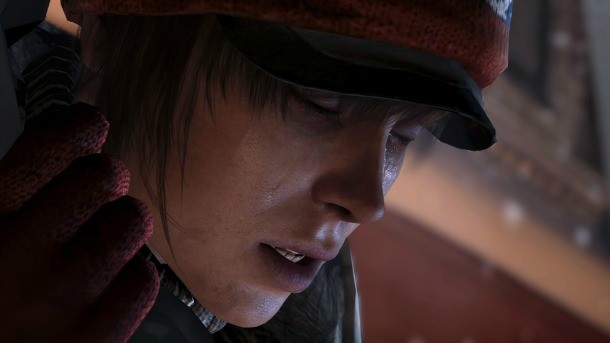Please support Game Informer. Print magazine subscriptions are less than $2 per issue
How Confronting Despair Influenced My Ending Choice In Beyond: Two Souls

Beyond's lead, the Ellen Page-modeled Jodie Holmes, doesn't love life, but I desperately want her to. For all of Beyond: Two Souls' storytelling foibles, empathy is one aspect David Cage draws out of players. Jodie is called nasty names, abused by the government, and treated like an experiment – all because she has the gift of being connected to an entity on the "other side."
The cost of Jodie's connection to Aiden is ever present, damaging or corrupting just about every relationship she has. So often, Jodie expresses that she just wants to be normal. Her life will always be complicated because of Aiden; it will never be any easier. She'll never know who she can trust, and she has to live in fear of what not only Aiden may do, but also what might happen if she's not around to fix the government's messes. Something hit home when I played Beyond, and it came in the form of one of the game's most haunting scenes, completely absent of supernatural elements.
Note: Major spoilers ahead involving the ending
Life is hard. At one point or another, I think we all tend to fall out of love with it. Either we face some unexpected hardship or see the ugliness in the world (you don't have to look far these days, thanks to the Internet's 24/7 news coverage). When you reach the homeless portion of the game, you see a different Jodie. She's always suffered from despair, but this time it's enveloped her entire soul. The toll of being attached to an entity and being robbed of any normalcy has beaten her down, and for the first time, the game challenges her to come back from it.
The depressing tone of this section is hard to ignore, but what jarred me the most was a simple action. I saw a knife in a tire. I went to interact with it because I thought it would be a weapon to help me survive in the harsh streets. What followed was something that still sends a chill down my spine, and Cage built up to it wonderfully with all the scenes showing the burden of Aiden (having Jodie's father call her a monster is as heart wrenching as it gets).
Jodie picks up the knife and places it against her wrist and then the game gives you the option to press down via QTEs. I dropped the controller and thought to myself, "I don't think I can play this." I've known that hopelessness, and the emotions flooded right through me all over again. However, I didn't stop playing, since I wasn't forced to complete the action, but then I walked outside and when I was near the roof's edge, the game presented me a new, just as disturbing, option: "Jump." Jodie lost her ability to see anything worthwhile about her life. It made sense, but it was also horrifying to know that she no longer felt like fighting.

The chapter may end with a glimmer of hope, as Jodie helps deliver a baby, and for the first time, sees her abilities in a more positive light, but what I wasn't expecting was how this suicidal moment would impact how I felt about Beyond's ending. Jodie once again gets pulled into another task to help better the world; she must approach a rift into the Infraworld. During the task, she experiences all the lost spirits' sad thoughts about wanting to live again. She prevails through their despair, but then she begins to morphs into different versions of herself, almost like her life is flashing before your eyes. After fighting through these painful memories to reach the condenser that links both the spiritual and living worlds, she makes a choice: To live or go to the beyond.
Both choices hang before you, the beyond shines brightly, while the living has a dark aura, representing the ugliness of the world. The easy choice is right in front of her; if she picks the afterlife, she's with those she's loved, like her real mother and Aiden and a slew of other people, depending who died in your playthrough. But something about this choice seemed too easy for me, as she says when you view the grimy life option, "Living. Feeling. Being in love. Growing old. So many things I still have to do..."
Remember: Jodie Holmes doesn't love life, but I desperately want her to. Cage provided me all the storytelling parts, now it was my turn to combine them into something special. At one point during Beyond, in the homeless section, Jodie was presented with the choice of life or death. She kept leaning towards death, so when she was given the choice once again, I wanted to give her what she always desired: a normal life. I needed to give her a chance to see the world without having Aiden. For to truly have a life of her own, she needed just that – to be on her own.
Depending on your choices, Beyond has many different ending variations, but making that choice between beyond and life is a big moment. It let me have a say in how Jodie developed, and I wanted it to say something strong: that she could triumph over the suicidal thoughts and build a life on her own. We all can relate to losing excitement over life, but powering through the pain and making something better of ourselves? That's powerful. And that's life.










